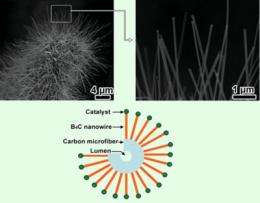Ordinary T-shirts could become body armor

(PhysOrg.com) -- A simple cotton T-shirt may one day be converted into tougher, more comfortable body armor for soldiers or police officers.
Researchers at the University of South Carolina, collaborating with others from China and Switzerland, drastically increased the toughness of a T-shirt by combining the carbon in the shirt’s cotton with boron - the third hardest material on earth. The result is a lightweight shirt reinforced with boron carbide, the same material used to protect tanks.
Dr. Xiaodong Li, USC College of Engineering and Computing Distinguished Professor in Mechanical Engineering, co-authored the recent article on the research in the journal, Advanced Materials.
“USC is playing a leading role in this area. This is a true breakthrough,” Li said, calling the research “a conceptual change in fabricating lightweight, fuel-efficient, super-strong and ultra-tough materials. This groundbreaking new study opens up unprecedented opportunities.”
The scientists started with plain, white T-shirts that were cut into thin strips and dipped into a boron solution. The strips were later removed from the solution and heated in an oven. The heat changes the cotton fibers into carbon fibers, which react with the boron solution and produce boron carbide.
The result is a fabric that’s lightweight but tougher and stiffer than the original T-shirt, yet flexible enough that it can be bent, said Li, who led the group from USC. That flexibility is an improvement over the heavy boron-carbide plates used in bulletproof vests and body armor.
“The currently used boron-carbide bulk material is brittle,” Li said. “The boron-carbide nanowires we synthesized keep the same strength and stiffness of the bulk boron carbide but have super-elasticity. They are not only lightweight but also flexible. We should be able to fabricate much tougher body armors using this new technique. It could even be used to produce lightweight, fuel-efficient cars and aircrafts.”
The resulting boron-carbide fabric can also block almost all ultraviolet rays, Li said.
Provided by University of South Carolina

















